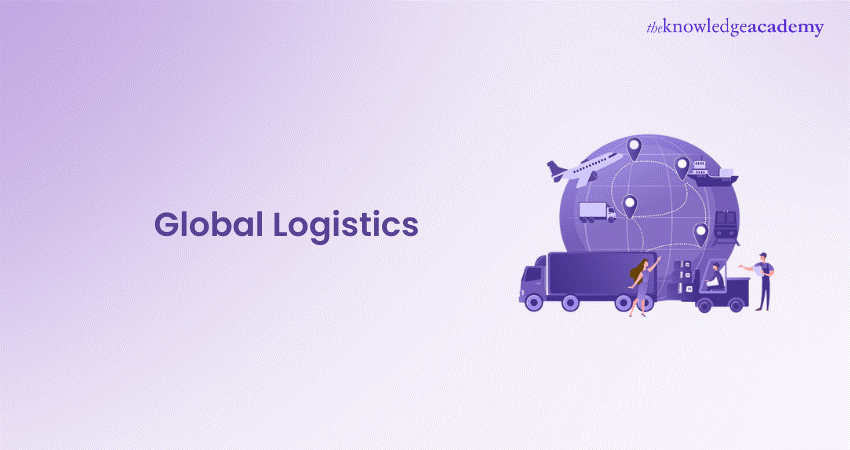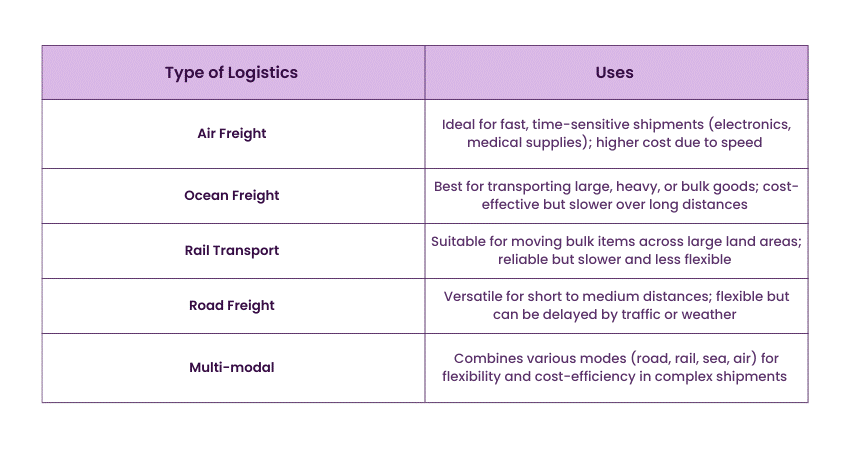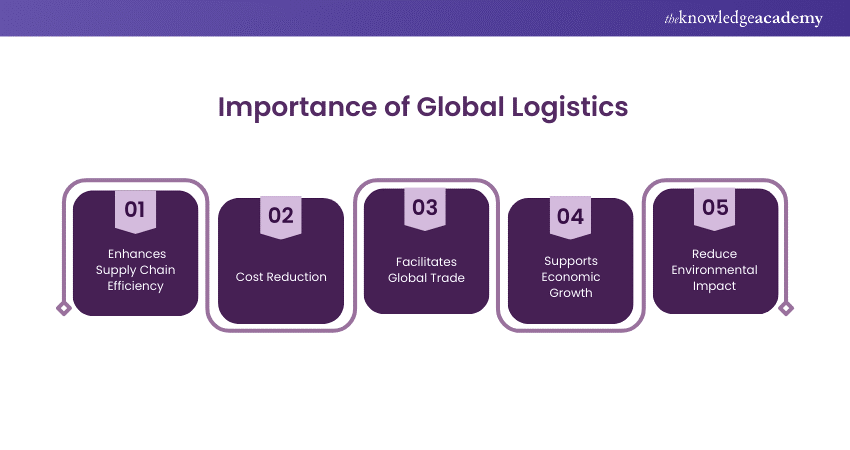We may not have the course you’re looking for. If you enquire or give us a call on +44 1344 203 999 and speak to our training experts, we may still be able to help with your training requirements.
Training Outcomes Within Your Budget!
We ensure quality, budget-alignment, and timely delivery by our expert instructors.

Have you ever wondered how a product manufactured in one corner of the world can be in your hands within days? The answer lies in the seamless system of Global Logistics. But What is Global Logistics? It’s not just about transporting goods from one place to another – it’s the backbone of global trade, ensuring that everything from electronics to fresh produce reaches you on time, no matter the place it starts.
In this blog, let’s explore What is Global Logistics, breaking down what it involves and why it’s so crucial for modern businesses. Ready to uncover the magic behind how your favourite products travel the world? Let’s dive in!
Table of Contents
1) What is Global Logistics?
2) Types of Global Logistics
3) Importance of Global Logistics
4) Examples of Top Global Logistics Providers
5) Conclusion
What is Global Logistics?
Global Logistics entails coordinating the flow of goods, information, and resources (including energy and people) from their point of origin to their destination on a global basis. This process includes information technology, transportation, managing inventories, warehousing, material handling, and packaging across an international network.
It takes into account numerous factors, including trade laws, political boundaries, economic fluctuations, and geographical challenges. These considerations ensure the efficient and effective movement and storage of goods and services.
Types of Global Logistics
Here are the primary types of Global Logistics:

1) Air Freight
a) The quickest mode of transportation for international shipping.
b) Ideal for urgent deliveries of electronics, medical equipment, or expensive goods.
c) Provides rapid delivery compared to other logistics options.
d) Expensive because of higher fuel costs and limited space on planes.
e) Typically used when speed is a priority over cost efficiency.
2) Ocean Freight
a) A most common method for transporting large quantities of goods internationally.
b) Involves shipping containers loaded onto cargo ships for ocean travel.
c) Cost-effective for heavy or bulk goods.
d) Suitable for long-distance transportation.
e) It has longer transit times compared to air freight.
3) Rail Transport
a) Widely used in landlocked countries or regions with strong rail infrastructure.
b) Reliable and cost-effective for moving goods across large land areas.
c) Ideal for heavy or bulk items.
d) Often slower than road or air freight.
e) Less flexible in terms of delivery locations compared to other modes.
4) Road Freight
a) Involves transporting goods by trucks, ideal for short to medium distances.
b) Commonly used for domestic shipments or part of a multi-modal system.
c) Offers flexibility in delivery times and locations.
d) Can face delays due to traffic or weather conditions.
e) Versatile and widely applicable across various industries.
5) Multi-modal
a) Combines two or more modes of transportation to ensure an efficient flow of products.
b) Products are transported via ocean freight and then loaded into a truck for final delivery.
c) Increases flexibility in shipping routes and delivery points.
d) Cost-effective by utilising the strengths of each mode of transport.
e) Ideal for optimising logistics for long-distance, complex shipments.
Start your journey to success with CIPS Level 2 Certificate In Procurement And Supply Operations Course – sign up now!
Importance of Global Logistics
Here are some of the key reasons why Global Logistics is so important:

1) Enhances Supply Chain Efficiency:
Ensures goods are delivered on time, reducing delays and streamlining operations.
2) Cost Reduction:
Optimises transportation, reduces warehousing expenses and minimises fuel consumption.
3) Facilitates Global Trade:
Enables businesses to expand into new international markets and reach global customers.
4) Supports Economic Growth:
Efficient logistics contribute to economic development by improving trade and creating jobs.
5) Sustainability Focus:
Reduces environmental effects by optimising routes, adopting eco-friendly technologies, and utilising resources efficiently.
Elevate your procurement expertise with our CIPS Level 3 Advanced Certificate In Procurement And Supply Operations Course – join now!
Examples of Top Global Logistics Providers
Several companies are leading the way in Global Logistics, offering comprehensive services to businesses worldwide. Some of the top Global Logistics providers include:
a) DHL: Known for its extensive network and innovative solutions, DHL offers a wide range of logistics services, including express delivery, freight transportation, and supply chain management.
b) FedEx: A major player in the logistics industry, FedEx provides reliable and fast shipping services, along with advanced tracking and logistics solutions.
c) UPS: UPS is renowned for its efficient parcel delivery services and robust logistics infrastructure, catering to businesses of all sizes.
d) Maersk: As one of the biggest shipping companies in the world, Maersk specialises in ocean freight and integrated logistics solutions.
e) DB Schenker: This company offers a comprehensive range of logistics services, including land transport, air and ocean freight, and contract logistics.
Elevate your procurement expertise with our CIPS Level 4 Diploma In Procurement And Supply Training to empower your career for success today!
Conclusion
Understanding What is Global Logistics shows its critical significance in promoting international trade. It is an invisible force that keeps goods moving smoothly across borders, connecting businesses and consumers all over the world. Global Logistics, whether by air, sea, or land, is the driving force behind modern trade and keeps the world turning.
Achieve Certification in procurement with our expert-led Procurement Training & Certification Course - sign up today!
Frequently Asked Questions

Companies can reduce costs in Global Logistics by:
a) Optimising shipping routes
b) Consolidating shipments
c) Utilising multi-modal transportation
d) Negotiating with carriers
e) Leveraging technology for efficiency
f) Adopting eco-friendly practices to lower fuel consumption

Global Logistics involves managing the transportation of goods across international borders, which requires an understanding of customs and international laws and regulations. Domestic logistics, on the other hand, deals with transporting goods within a particular nation.

The Knowledge Academy takes global learning to new heights, offering over 30,000 online courses across 490+ locations in 220 countries. This expansive reach ensures accessibility and convenience for learners worldwide.
Alongside our diverse Online Course Catalogue, encompassing 19 major categories, we go the extra mile by providing a plethora of free educational Online Resources like News updates, Blogs, videos, webinars, and interview questions. Tailoring learning experiences further, professionals can maximise value with customisable Course Bundles of TKA.

The Knowledge Academy’s Knowledge Pass, a prepaid voucher, adds another layer of flexibility, allowing course bookings over a 12-month period. Join us on a journey where education knows no bounds.

The Knowledge Academy offers various CIPS Courses, including CIPS Level 6 Professional Diploma In Procurement And Supply Course, CIPS Level 2 Certificate In Procurement And Supply Operations Course and CIPS Level 4 Diploma In Procurement And Supply Training. These courses cater to different skill levels, providing comprehensive insights into CIPS.
Our Accounting and Finance Blogs cover a range of topics related to CIPS, offering valuable resources, best practices, and industry insights. Whether you are a beginner or looking to advance your Procurement And Supply Chain skills, The Knowledge Academy's diverse courses and informative blogs have got you covered.
Upcoming Accounting and Finance Resources Batches & Dates
Date
 CIPS Level 6 Professional Diploma in Procurement and Supply Course
CIPS Level 6 Professional Diploma in Procurement and Supply Course







 Top Rated Course
Top Rated Course



 If you wish to make any changes to your course, please
If you wish to make any changes to your course, please


